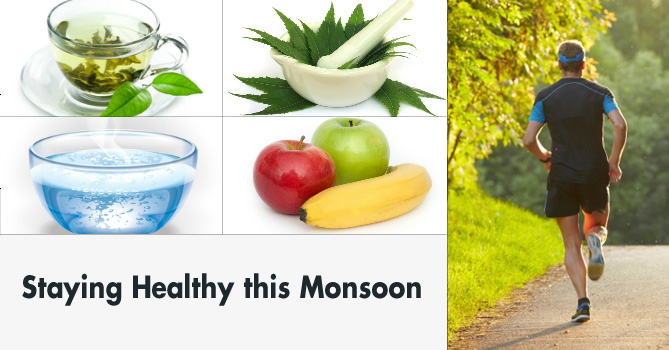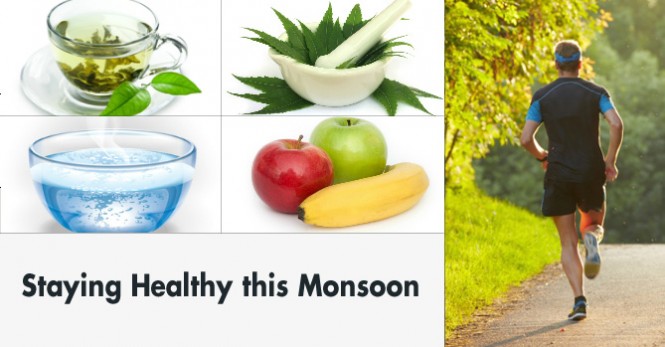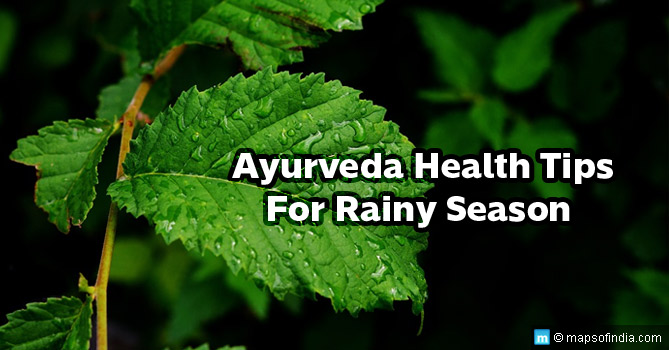With the onset of Monsoon comes the rain which brings enormous fun but also the risk of diseases. People look forward to monsoons as it provides respite from the scorching heat. The petrichor gives us an ecstatic feeling. But, the health hazards with the onset of monsoon cannot be ignored. The damp weather leads to the rise of several types of mosquitoes and the result is various diseases and health problems.
Some of the common health issues are infections, indigestion problems, allergies, including cold and cough. We generally console ourselves by saying that these are due to the change of season. Also, there are some other diseases like malaria, dengue, typhoid, viral fever, conjunctivitis, gastrointestinal disturbances, pneumonia, and diarrhea.
Also Read This: Highest Rainfall States in India!
Dietary Regulations For The Monsoon As Per Ayurveda
Tips to Stay Healthy This Monsoon
We can get rid of such illnesses during the rainy seasons if we can take some preventive measures and maintain a healthy regime. So, here we present some helpful tips to stay healthy during monsoons:
DIET: What not to Avoid?
• Eat fruits like apples, pomegranates, lime fruits, bananas etc. which can keep your body strong.
• Drink lots of water and fresh-fruit juices to keep yourself hydrated. Boil your drinking water before consuming it.
• Opt for curd and almonds in your diet.
• Consuming bitter vegetables like bitter gourd and herbs like neem help in preventing infections.
• Consume herbal tea at regular intervals as it has anti-bacterial properties. Teas like jasmine tea, chamomile tea or green tea are healthy as they build up your resistance to fight against infections.
• Wheat, barley, horse gram, peas, and green leafy vegetables should be consumed during the monsoons to stay healthy as they are nutritious.
• To increase your immunity, add garlic in your diet, especially in soups.
Five Things to make your Monsoon Fun and Memorable!
Some Dos
• If you get wet, take shower immediately as rain water contains acids which are harmful to the skin. This will also protect you from infections.
• If you drink boiled water, add 3-4 drops of chloride in one liter of water to kill the harmful micro-organisms and other impurities.
• Keep your house clean and pest-free. Make sure that there is no waterlogging in your house as it is a breeding ground for mosquitoes and bacteria.
• To stay healthy and fit, do exercises regularly.
• Increase your intake of vitamin C to help build resistance against infections and diseases.
• Dry your feet when they get wet.
• Use a powerful insect repellent to keep mosquitoes away.
• Wash your hands at regular intervals, especially when you come from outside.
DIET: What to Avoid?
• Though mango and watermelons are the best seasonal fruits during this time, consume less of these fruits. Fruits like mangoes cause stomach infection, pimples and increase the heat inside the body. Fruits like melons increase the water retention in the body which can give rise to swelling in your body.
• Avoid oily and spicy food. Also avoid heavy salty food as it can reduce water retention and increase blood pressure. This is also to be avoided for preventing skin allergies.
• Avoid as much as possible street food, fast food and the snacks from the roadside stalls, as these are the real cause of gastrointestinal problems.
• Avoid excessive intake of coffee and tea as they dehydrate the body.
• Avoid fish and meat as much as possible. The monsoon season is the best time for breeding for fish and hence fish should be avoided as it can cause stomach infection.
Why Mumbai almost drowns when the monsoon arrives? ( Read this )
Some Don’ts
• Do not enter an air-conditioned room with wet hair and damp clothes as this can lead to a viral fever or cold and cough.
• Keep children away from playing in the rain and rainy water.
• Asthma or diabetic patients should not stay close to wet or damp walls as it leads to the growth of fungus and can be especially harmful.
• Don’t touch your face with your dirty hands as there is every chance of the flu virus to enter through the eyes, nose and mouth.
Some Homemade remedies
• Boil water with dry ginger to get immediate relief if you are having cold and cough.
• Gargle with lukewarm saline water if you have sore throat or pain.
• Boil water with tulsi, ginger and honey and drink the juice to treat viral fever.
• For people who consume alcohol, avoid whiskey, rum and opt for wine which can increase your body immunity and prevent infections.
• In case, you get any skin infections or allergies, boil neem leaves in water and take a bath with it.
• Make use of eucalyptus oil during the monsoons. A little inhalation of this oil can give you relief from blocked nose. You can add few drops of this oil in water, heat it and use it to steam your face. The aroma helps you to breathe easily which can relax the entire body.
Read Also:
Dengue and Chikungunya: Causes, Symptoms, Prevention, Treatment
Organ Donation in India
Jaundice – Causes, Symptoms, and Prevention
Health & Fitness Gadgets
Hepatitis B in India: Guidelines for Prevention, Symptoms, Causes, Risks & Treatment
The 10 Ways to Quit Smoking
How Useful are E-cigarettes?
Tobacco – The Leading Cause of Illnesses
Green Tea: Types, Benefits and Side Effects
Japanese Encephalitis in India – Guidelines for Prevention, Control & Symptoms
Swine Flu Continues to Ravage India
Ebola Virus Outbreak – Is India Prepared?
India To Be Certified As A Polio-free Nation By WHO
Non-Communicable Diseases – Take Care, Before It’s Late
Swine Flu: What You Need to Know and Do
Prevention of Heart Attack and Other Related Heart Diseases
Leprosy – Causes, preventions and eradication programme
Prevalence of Diabetes in India






